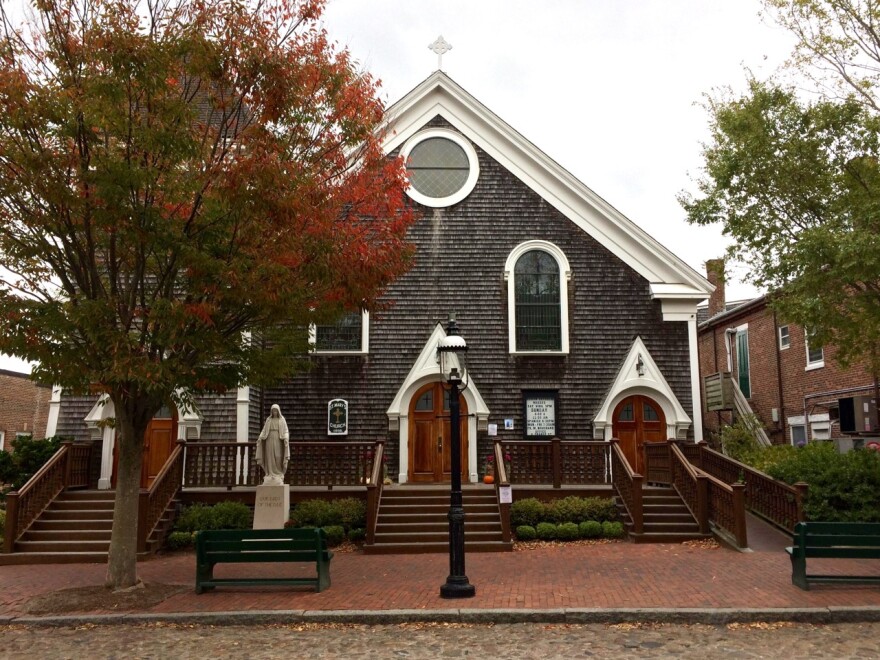The Lewis family ran Nantucket’s only funeral home for 135 years. They closed it nearly 3 years ago and sold the land when nobody wanted to take over the business. Now, a small group of people is trying to open a new one as a non-profit. For some, Nantucket’s identity as a real community is at stake.
Ginger Andrews is one Nantucketer who supports the effort to open the non-profit funeral home. She’s dressed in what might be the Nantucket uniform: a wool sweater and Carhartts, driving her pickup down the narrow cobblestone streets with her dog. She left the island for college, but otherwise she’s lived here all her life, sometimes shucking oysters to earn money.
"Like everybody did," she said.
Other than her great-great-grandfather who drowned in Boston Harbor, she can visit most of her family at the Prospect Hill Cemetery. And for 135 years, it was the Lewis family that buried them.
It seems like a strange thing in a way, but not a morbid thing. It is how we heal from our grief. - Ginger Andrews
But when Ginger Andrews’ mother died last year at 100 years old, the funeral home was gone. Her mother wasn’t religious, but then, the funeral home didn’t feel religious either. Andrews says it was just part of the town. She missed having a place to gather with her friends after her loss.
“It seems like a strange thing in a way, but not a morbid thing,” she said. “It’s how we heal from our grief.”
The funeral home closed after losing $200,000 over ten years doing funerals for free for people who couldn’t pay.

Nantucket is not the only place to lose its funeral home. In those ten years, nearly 10 percent of funeral homes closed across the country, partly because of the rise in cremations, which don't cost as much. The difference is, Nantucket is an island. You can’t drive to the next town.
“Right now we have to send people off island for embalming and then they are shipped back for a funeral or a wake, so it’s made things pretty difficult,” said Catherine Flanagan Stover. She’s the Nantucket resident who is trying to start the non-profit funeral home and crematorium on the island.
This kind of non-profit is rare, but a handful do exist nationwide. As a Catholic growing up on Nantucket, Flanagan Stover says she was dragged along to a lot of funerals by her parents and grandparents.
“I was always fascinated with the whole process of death and funeralization,” she said. “And then as I got older, in high school, I began to think of it as a career. And they said, women don’t do that.”
She went to mortuary college anyway and worked in the funeral business off-island. Then she came back home to Nantucket. Now she’s the Nantucket town clerk and says wouldn’t take the job of doing embalming at the new funeral home. But she wants it to exist.
“Caring for the body is a corporal work of mercy in my faith,” she said. “But I also think that it’s very important for other people to know and trust the people that they are giving their family to.”
It’s unclear how much business the non-profit would need to stay open. Just 66 people died last year on Nantucket and two-thirds were cremated, which carries a lower charge. The non-profit believes it will cost about $1.5 million to open the facility. It's working on raising the money now.

Allen Reinhard is a former selectman and the chairman of the Nantucket Cemetery Commission. He hasn’t come out against the non-profit idea, but he questions whether there is enough demand to keep it open.
“Particularly when you look at the expense that is involved,” he said. “Catherine is looking for a parcel of land. And of course, land on Nantucket…there are a lot of demands.”
The piece of land where the Lewis funeral home once stood serves as an example of the land pressures facing the island. Where there was once a cedar-shingled building and a garage, four houses now stand in a cluster, each on the market for more than $2 million.
“It’s really astounding,” Reinhard said.
Ginger Andrews says that it’s hard to feel like you live in a real town when you’re surrounded by investment properties. She says building a funeral home would restore a bit of that community.
“I think there’s a tendency sometimes to try and regard the town as a business and try to make it solvent as a business,” she said. “But you are not there for the sole purpose of making money.”
In the spring, the non-profit will ask town meeting to give them a long term lease on a piece of land to build the funeral home. Flanagan Stover is working on the details of that request now. She is matter-of-fact about the chances of success.
“If islanders want a funeral home, they will vote for one of the parcels,” she said. “If they don't, they won't.”








